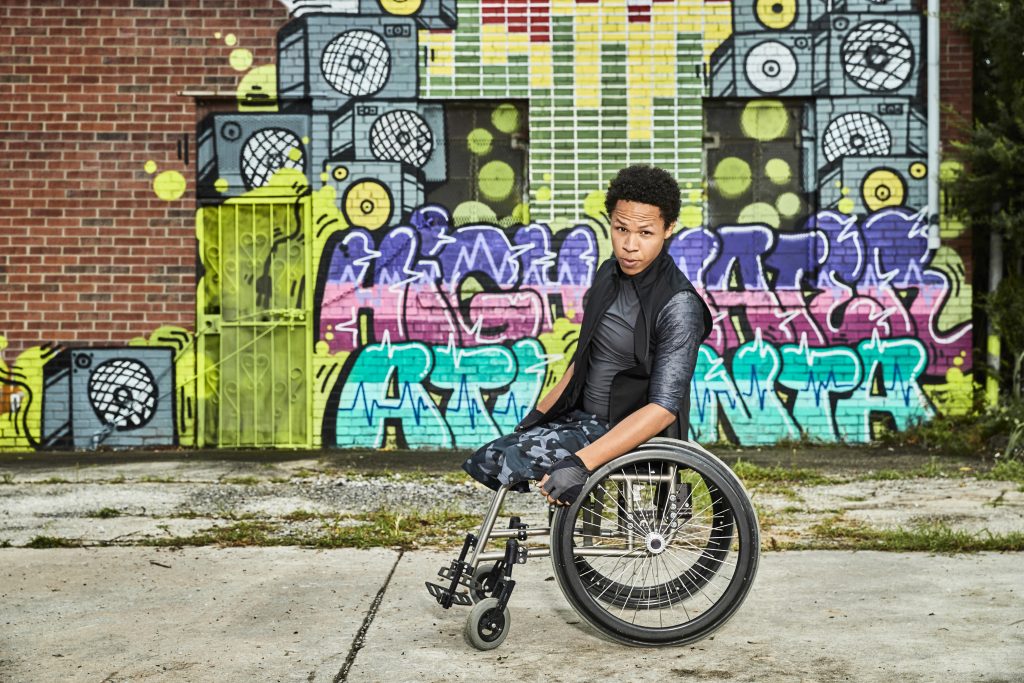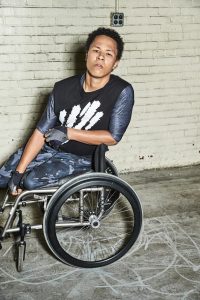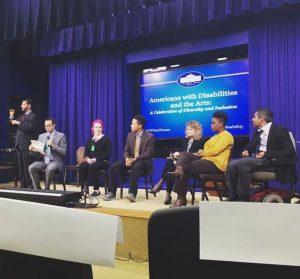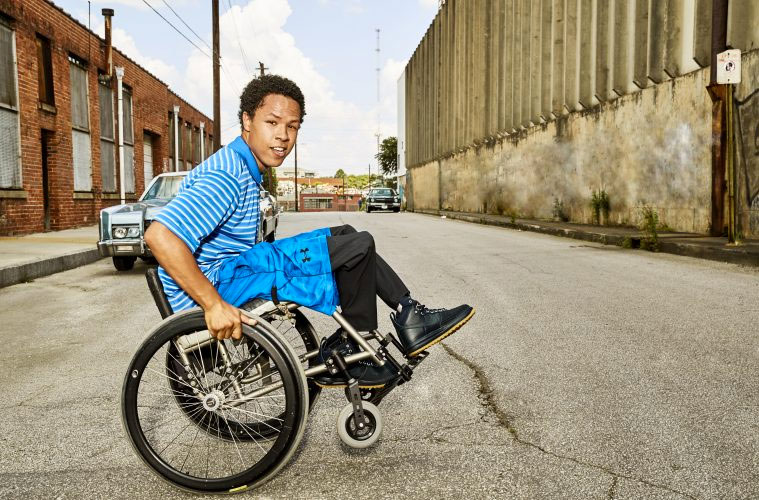Not to long ago we heard about Step Up: High Water’s (produced by Jenna Dewan Tatum and starring Ne-Yo) Eric Graise, a double amputee making his dancing debut. He’s been gracious enough to sit down with This Is WOD to tell his his story, and spoiler alert: it’s incredible. Read on to hear everything from his early years to going to The White House, to being on-set with Ne-Yo.

ThisIsWOD: Can you tell us about how and when you got into dance?
EG: You know, I’ve answered that question a lot lately and normally I answer with how I started with Full Radius Dance Company, but honestly, I think I’d have to blame it on The Mighty Morphin Power Rangers. I have a million aunts, uncles and cousins who will all tell you in an instant how little Eric would do kicks and flips all over the house. I kicked, I punched, I jumped, I got messy, just like any other kid. I wasn’t a child you could easily label with the typical stereotypes imposed on people with disabilities. I was wild is the short answer. But what I lacked in control, I made up in artistic expression.
I’ve never wanted to be anything other than a performer. In high school I was in every art activity and club, so much so I was voted “Most Outgoing” in the senior superlatives. But I started my classical/opera training at the age of 11 and continued with it until I had a full ride to college on a vocal performance scholarship. It took a year of hating college and a dramatic crying fit over my Mother’s shoulder in the school parking lot before I realized the strict, clinical opera life just wasn’t my bag. But while I was there, the theatre department held a dance performance that really changed the direction of my life.
I was in theatre all through high school and was even an honor thespian in the International Thespian Society, but I’d already convinced myself that theatre wasn’t an option for me. How would I do the dances? Who would cast me? I’d end up poor is what I told myself. Opera was safe in my mind because there were plenty leading roles that didn’t require an actor to dance. All I knew is I wanted to sing and act on stage and that’s how I’d do it. But attending musicals at the college felt like sheer torture. I wanted to be on stage so bad. I really envied them. One show in particular really captivated me, but it was a dance show. I’d never been to a dance show and dance was, of course, a touchy subject for me. But this wasn’t just dance alone, it was theatre. It had lights and transitions and through line and I’d never thought of dance in that way. It gave me an itch to find out more.
After that dance show is when I really dug deep into watching YouTube clips from shows like So You Think You Can Dance. I spent hours dreaming of being choreographed by Mia Michaels. I still don’t think I can watch “the bench dance” and not start crying instantly. Also Travis Wall was phenomenal and I remember imagining myself dancing like him. But it was never my own body I imagined. I pictured myself with legs and I could feel all the movement in me, but that’s right around the time I would have to turn the video off. It hurt too much. I would get into some pretty bad crying fits and depression over it. The worst part is I LOVED myself. Sure, I went through body issues like everybody else growing up but I really learned to love being different. But this wasn’t about being different, this was about not being able to dance at all. I felt chained.
ThisIsWOD: What were some of the challenges you faced early on?
 EG: I think the biggest challenge I faced was not having any role models who looked like me. So how was I to know that I could create art with the body I had? I’d convinced myself that I had to try and look like everyone else. I spent time trying to perfect my walk. I would stuff socks in my socks so that my pants wouldn’t cling to the metal rod that is my ankle. I didn’t do this in my regular life, I could care less on the street. But on the stage, I felt if people saw how I walked or if I tripped or if they just noticed anything different, that I’d ruined the show. That I was taking people out of the moment, out of the world of the show, to wonder about me the actor and not my character.
EG: I think the biggest challenge I faced was not having any role models who looked like me. So how was I to know that I could create art with the body I had? I’d convinced myself that I had to try and look like everyone else. I spent time trying to perfect my walk. I would stuff socks in my socks so that my pants wouldn’t cling to the metal rod that is my ankle. I didn’t do this in my regular life, I could care less on the street. But on the stage, I felt if people saw how I walked or if I tripped or if they just noticed anything different, that I’d ruined the show. That I was taking people out of the moment, out of the world of the show, to wonder about me the actor and not my character.
Or that someone might laugh even, which can happen when you’re a performer with a disability. People don’t usually say mean things to me on the street, they normally just stare me down, trying to figure my walk out. But on a stage, once that fourth wall is there, some people feel free to laugh or comment as if I’m not 5 feet away from them. I’ve grown stronger from it
and much more confident, but it was tough in my early years. I’d say the first time I felt free on stage was in my high school production of Stephen King’s “Misery”, where I was out of my prosthetics most of the show. For the first time, it felt like no one’s eyes were on Eric the amputee. They were looking at Paul the amputee. As an actor, you can feel the difference.
ThisIsWOD: How did you overcome these challenges and find your own path?
EG: After leaving opera behind, I figured it was time to get practical. Being a performer might not be for me and that’s okay, I’ll get a real people job and stop fooling myself with these silly acting dreams. I’d been drawing most of my life and I love to organize, so I decided to get a marketing degree by transferring to the University of West Georgia. Of course I couldn’t stop doing art so I did everything I could to perform while getting a degree in marketing. I started an organization at UWG from my previous school called Black Tie Affair, for performers of color. I got a job as an anchor at the university’s television station, where I went on to become producer/director. I started a short film team and won three collegiate short film awards, all best in show, as the director/writer. PLUS I was performing in the university’s musicals and I did all these things within the first year of transferring.
At this point the theatre faculty decided to sit me down and ask me why I wasn’t pursuing a degree in theatre. I told them how I felt and how I didn’t think it was practical for me and they just shut all that down. They told me in the theatre, people want to see different and that it wasn’t about my disability, it was about how talented I was and that being different only makes that all the better. So I started over, after 3 years of college and I spent another 3 years earning my theatre degree.
During that time a faculty member, asked me to come to her office after class. I had just gotten out of a voice and movement class with her and she wanted to show me a video. It was was a physical theatre company called DV8. The title of the movie was “The Cost of Living” and it’s the story of two friends, both street performers, and their day to day lives. Well, one of these men was a double leg amputee. The movie was mostly movement based and featured dance scenes with both him and other able bodied dancers. I couldn’t believe what I was watching. This man was doing the very thing I’d spent my entire life convincing myself I couldn’t do. That moment changed my life and I told her so right then and there.
ThisIsWOD: Before Step Up: High Water, what were you up to?
EG: Changing my major was the best thing I could have done for myself. I was able to play roles such as Tom Collins in “RENT”, Papa Ge in “Once On This Island” and in my senior year, Sally Bowles from “Cabaret”. All able bodied characters I had no fear in bringing to life. In the first year I was offered an internship with Tara Rubin Casting in New York, where they cast numerous Broadway shows. Then I went on to be a finalist for two consecutive years in The Kennedy Center American College Theatre Festival; once as best musical act and the other as best comedic actor. The 2nd year I was invited to perform at the Kennedy Center in Washington, DC as a Blanche and Irving Laurie theatre fellow, the first winner ever from the southeast region. I left college as the president of Alpha Psi Omega, student representative for the theatre department and company member of the year. I also bagged a few featured walker roles on The Walking Dead, season 2, 6 and 7.
First thing I did after college was apply for an internship at Actor’s Express in Atlanta and out of 200 applicants, me and 12 others got the job. I spent a year there working long hours and late nights with some of the best theatrical actors in the state and I really got to see professionals and their process, which did so much for me as an actor. During my time in the internship, I was asked by Gregg Mozgala of The Apothetae theatre company, to play the lead role in a play reading of the musical “The Penalty”. The play reading took place in NYC’s The Public Theatre. The role was Blizzard, a street urchin pimp who has vowed to seek vengeance on the man who amputated his legs as a young boy. The role was dirty and vulgar and I loved every minute of it.
 Later that year I was invited by The White House, under the Obama administration, to be a guest panelist for their 25th Anniversary Celebration of the Americans with Disabilities Act. The panel was a discussion on the arts and how people with disabilities are being represented in the arts. The event also included actors Marlee Matlin, Camryn Manheim, and Ali Stroker from Glee.
Later that year I was invited by The White House, under the Obama administration, to be a guest panelist for their 25th Anniversary Celebration of the Americans with Disabilities Act. The panel was a discussion on the arts and how people with disabilities are being represented in the arts. The event also included actors Marlee Matlin, Camryn Manheim, and Ali Stroker from Glee.
ThisIsWOD: How did Step Up: High Water happen for you?
EG: After my internship I landed a spot in Full Radius Dance Company under the direction of Douglas Scott. FRD is a modern, integrated dance company, located in Atlanta, featuring dancers with disabilities and able bodied dancers. That year we danced for TEDx, NPR, and did a tour in Spain under the hire of the US Embassy. Right before we left for Spain, the company director gets an email stating that Lionsgate is doing a search for someone to play the role of King in their upcoming YouTube Red original series Step Up: High Water. The description said:
“King is a talented freestyle singer/rapper/dancer who, along with his partners Rigo and Poppy, is an integral part of the Atlanta street dance and party scene. King uses his wheelchair as part of his dance moves, and he can do more with his head, neck, and hands than most professional dances can do with their whole bodies. Hasn’t dealt with the emotional realities of his situation, he keeps his head down and is hard working. Like Poppy (on whom he has a crush) and Rigo, King is a member of Sage Odom’s prestigious High Water arts collective…Quite possibly the most talented person there, if he can come to terms with his reality he can blow up.”
I really couldn’t believe what I was reading. This role was ME! For the first time in my life I would have the chance to play a role that actually reflected me as a person. But once it sunk in, so did the nerves. Clearly EVERY young male dancer with a disability is gonna be after this role, because I’m definitely not alone and we’ve all been waiting for this chance. I knew that if I was going to get this role, I was going to have to show them more than just dancing. So I sent in my audition video of me freestyle dancing, but also I sent in a video of myself singing. I wanted to show that I was more than just an actor or a dancer, I was King! After I submitted, it didn’t take long before I was getting called in to read for the role. And not long after that I was cast.
ThisIsWOD: Tell us about filming and rehearsing, what was that like?
EG: Everything felt like it was happening so fast. First day of filming started early June and I wasn’t getting back from Spain until May 30th, so I was definitely going to be behind. I was nervous because I felt I was coming into a situation where I would be the odd man out. It was quite the opposite. The moment I got there, everyone was warm, open, and throwing me into the mix. It was like catching up with old friends before I even knew them. So the hardest part about filming was found within me. The nerves. A role like this only comes around once in a blue moon, so I knew I wanted to do it justice. King needed a personality beyond the typical “poor, cripple boy” type character, which is often times the way people with disabilities are written into stories. That’s our word by the way, haha. And what’s even better is the writers felt the same way from the get go. They always took the time to confer with me on a regular about where they wanted to take the character, to make sure they were staying true to the life of people with disabilities without reinforcing any unnecessary stereotypes. I was so grateful for it.
ThisIsWOD: Ne-Yo is a celebrity judge for NBC’s WOD, did you get to work with him directly?
EG: For sure! King is a student at High Water, which is a performing arts school in Atlanta and Sage Odom, Ne-Yo’s character, is the founder of the school, so we work together a good bit. Working with Ne-Yo is definitely one of the best parts of the job. We’re both usually laughing at some joke in between takes and he’s really great at giving advice on the industry. He’s super easy to talk to and he’s not about acting like he’s above anybody, even when he’s the biggest superstar in the room. Sage Odom on the other hand isn’t as humble. It’s crazy, because I go back and watch old videos of myself singing some of Ne-Yo’s classics and it’s still hard to believe that I’m working with him. It’s definitely an honor.
ThisIsWOD: What’s coming up next for you?
EG: The premiere of Step Up: High Water on YouTube Red of course! I’m so pumped and the whole cast is pumped as well. Everyone involved from cast to crew really put their hearts into this and it’s definitely gonna show. When you see us sweating on that screen, it isn’t fake. You’re watching people really put in work. Besides that, there are so many possibilities right now. Before submitting for the role of King, the plan was to audition for drama department at Yale University, so I’m still keeping that in mind for the future. But right now I’m currently writing a musical, taking fencing and wheelchair fencing lessons, and looking for the right producer for some music I’m writing. All and all, keeping my eyes open for the next big adventure.
ThisIsWOD: What are your dance/choreography goals?
EG: I hope to one day start my own art collective of people with disabilities. There are so many of us out there, creating some amazing work, but if people aren’t writing these characters like King or if they continue to cast able bodied actors in roles that should be filled by actors with disabilities, then how can PWDs be seen? I want to push for a more inclusive industry where roles like King are no longer surprising but expected. In order to do that, we not only need more roles for people with disabilities, but we also need to be encouraging writers with disabilities, directors with disabilities, cinematographers with disabilities, all of it! Art is a world that is a creation of our own imaginations, so within it, how can we put limitations on people who have no limitations on themselves?




